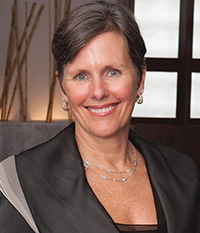Statistically speaking, female philanthropists in Chicago should be feeling particularly powerful. Data-backed research proves that a tidal wave of wealth has and will continue to transfer to women, who are more generous and effective donors. The way women use the internet further amplifies their philanthropic power. Chicago has been shown to be more philanthropic than any other U.S. city, making Chicago female philanthropists perhaps the most powerful of all.
1. Chicagoans give 50 percent more
A 2015 Indiana University Lilly Family School of Philanthropy study commissioned by the Chicago Community Trust proved that Chicago is an astonishing 50 percent more philanthropic than any other U.S. city. While average giving rates in the rest of the country are at 2 percent, Chicago leads the pack at 3.1 percent.
This generosity has recently been compounded by year-over-year giving growth, as reported in the past three Giving USA Annual Reports on Philanthropy. Americans continue to give more each year. Donations from individuals, as opposed to corporations or foundations, have grown an astonishing 72 percent in just the past year.
These statistics alone prove that Americans — Chicagoans in particular — should be celebrated for their philanthropy and will to create change. Reports on female giving are even better.
2. Females give more generously and effectively, control more wealth
Women give more generously, collaboratively, and effectively than men. Every year, additional Lilly Family School of Philanthropy studies surface in confirmation.
“At every age and income level, women give more than men. Younger women give twice as much,” says director of the Women’s Philanthropy Institute at the Lilly School Debra Mesch, MBA PhD. “In the top 25 percent of combined income and assets, women give 156 percent more than men!”
A recent New York Times article confirms these statistics and details how women use their wealth. “Like men, women want their investing to secure a comfortable life and a worry-free future … but women greatly differed with men on another financial goal: philanthropy. Fifty-eight percent of women wanted enough wealth to be able to give money away, compared with 39 percent of the men.”
And women don’t just write checks. When they adopt a charitable cause, they give their hearts, too. This leads them to also give time, talents, things and connections, according to Mesch and other experts. Women learn what else an organization needs and invite their friends to join in on supporting the cause.
At a recent Make It Better Money, Values, Impact Symposium, Melanie Sabelhaus, American Red Cross vice chairman and co-founder of its Tiffany Circle, former deputy administrator of United States Small Business Administration, senior principal of Jerold Panas, Linzy & Partners consulting firm, corporate board member, and builder of several successful businesses, demonstrated how these compelling facts led to the founding and spectacular growth of the Tiffany Circle — women who give $10,000 or more to the American Red Cross annually.
Sabelhaus presented additional proof that women are a rising financial power too — in business as well as philanthropy.
In 2015, the Bank of Montreal (parent of BMO Harris) published a landmark study showing that American women controlled 51 percent of personal wealth, with more rapidly transferring to them for demographic and other reasons. Women outlive men by more than five years, while next-generation women are outperforming men in education, work and other areas that indicate success.
By 2020, women will control $22 trillion of the $30 trillion total U.S. wealth — or almost 75 percent of U.S. wealth.
3. Women control consumer spending, leading to more marketing support for philanthropy
The rising financial power of women and their social and philanthropic sensibilities has led to a sea change in the marketing strategies of major brands; assuring more support for effective nonprofits.
Women control consumer spending — upwards of 80 percent of all dollars spent, according to Nielsen, Harvard Business Review and Forbes. They decide how their household budget will be spent on homes, family cars, vacations, health and education expenses, food, clothing and regular household supplies.
Ninety-two percent of well-educated, affluent women change their brand loyalty when they think it will make the world a better place. A Nielsen Company report explains this phenomena: “The female brain is programmed to maintain social harmony.” This also accounts for the growing popularity of brands tying support for a nonprofit cause to marketing initiatives.
4. Women’s internet use amplifies their philanthropy
Women use the internet differently than men. They do more research and community building, less entertainment watching and gaming. From the Nielsen report, one can extrapolate women’s philanthropic goodness and power is amplified online.
As of January 2018, Facebook, Omnicore, and Statista.com reported that:
- 52 percent of U.S. Facebook users are female.
- 68 percent of Instagram users are female.
- 81 percent of Pinterest users are female.
Only Twitter is used by a greater percentage of men than women.
Working from an understanding of how women use the internet and support philanthropies — by giving more and fostering collaboration — nonprofits can substantially amplify the inherent good of the female sensibilities.
Given their position as controllers of wealth in the most philanthropic city in the country, Chicago women should be celebrated as particularly powerful philanthropists!
More from Make It Better:
- Join Our Better Giving Circle to Support Your Favorite Nonprofit
- How to Raise More Money for Your Favorite Nonprofit
- How This Startup is Making It Easier for You to Support Women-Owned Businesses
 Susan B. Noyes is the founder of Make It Better. She practiced labor law at Sidley & Austin before deciding to lay down the law full-time for her six children instead. Her favorite time of the day is family dinner, despite her children’s constant misbehavior. Susan loves to network, build community, write, and organize lots of moving pieces. Her motto: “A clean home is a wasted life.”
Susan B. Noyes is the founder of Make It Better. She practiced labor law at Sidley & Austin before deciding to lay down the law full-time for her six children instead. Her favorite time of the day is family dinner, despite her children’s constant misbehavior. Susan loves to network, build community, write, and organize lots of moving pieces. Her motto: “A clean home is a wasted life.”

